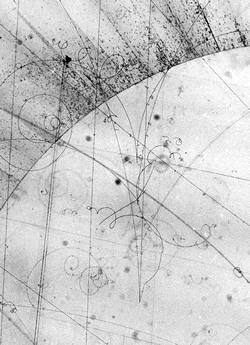

Sigma+ produced in a high energy numu interaction
This is an exceptional event, produced by a muon neutrino![]() with
an energy of about 50 GeV. The very straight outgoing track was identified
as a
with
an energy of about 50 GeV. The very straight outgoing track was identified
as a ![]() because
it escaped from the bubble chamber and was picked up in an electronic detector
called a multi-wire-proportional chamber. Any charged particle other
than a muon
because
it escaped from the bubble chamber and was picked up in an electronic detector
called a multi-wire-proportional chamber. Any charged particle other
than a muon ![]() would
have been absorbed by the material in the way.
would
have been absorbed by the material in the way.
The remarkable feature of this picture is that a visual analysis enables a
very large number of particles to be identified - so this is for connoisseurs!
Here we draw attention to a part of the whole event – the production and decay
of a ![]() ,
which is followed by a sequence of further decays and interactions. Photos
,
which is followed by a sequence of further decays and interactions. Photos
![]() of the
event, which was taken in the Big European Bubble Chamber (BEBC) at CERN filled
with a mixture of neon and hydrogen, were taken on four views. The
of the
event, which was taken in the Big European Bubble Chamber (BEBC) at CERN filled
with a mixture of neon and hydrogen, were taken on four views. The ![]() decay story has been highlighted on
each
view.
decay story has been highlighted on
each
view.
Click on the pictures below for other views.
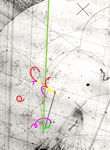 1st view |
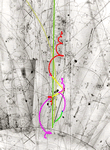 3rd view |
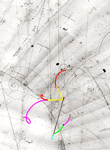 4th view |
The event looks quite different on different views because of the optics - the cameras are more separated than they are in the CERN 2m chamber and they have fish-eye lenses.
On view one we have highlighted a 'Compton' electron which shows that negative particles turn to the right.
We see:
- the
 track kinks to the right; the outgoing charged track is a
track kinks to the right; the outgoing charged track is a  ,
and it is accompanied by a neutron which does not leave a track;
,
and it is accompanied by a neutron which does not leave a track; - the
 travels
a short distance, stops, and decays to a short
travels
a short distance, stops, and decays to a short  track;
track; - this
 moves
a very short distance to the right before stopping and decaying into a spiralling
positron
moves
a very short distance to the right before stopping and decaying into a spiralling
positron  .
.
While this sequence of decays was taking place, the neutron ![]() from
the decay of the
from
the decay of the ![]() was
carrying most of the sigma's momentum forward – the
neutron mass is about 85% that of the sigma mass.. This neutron then collided
with
a proton, giving it enough momentum to leave a short dark stopping track. This
was
carrying most of the sigma's momentum forward – the
neutron mass is about 85% that of the sigma mass.. This neutron then collided
with
a proton, giving it enough momentum to leave a short dark stopping track. This
![]()
![]() collision
also yielded a
collision
also yielded a ![]() which
decayed into two photons
which
decayed into two photons ![]() ,
both of which produced
,
both of which produced ![]()
![]() pairs.
The full reaction, with details of the
pairs.
The full reaction, with details of the ![]() decay
sequence is
decay
sequence is
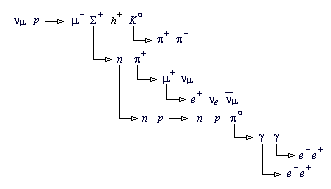
For a full discussion of this event, including a discussion of the other unseen neutral particles, measurements, and calculation of masses, click here.